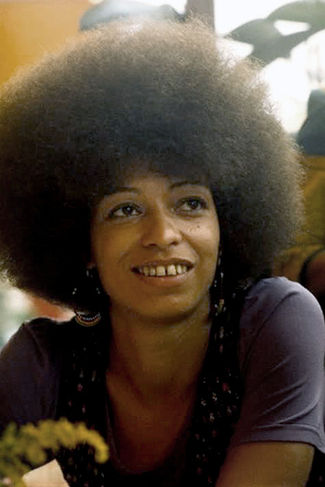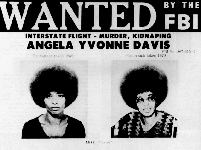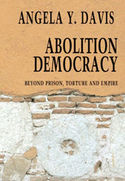Angela Davis
Angela Yvonne Davis (born January 26, 1944 in Birmingham) is a radical activist who was associated with the Black Panther Party in the 1960s and 1970s, primarily working for racial and gender equality and for prison abolition. Having retired from full-time teaching in 2008, she is now a Distinguished Professor Emerita at the University of California, Santa Cruz.
Childhood
Angela Davis was born in 1944 in Birmingham. Her father, Frank Davis, was a graduate of St Augustine's College, a historically black college in Raleigh, North Carolina. He taught high school history before leaving the profession to open a service station in a black section of Birmingham. Davis' mother, Sallye, also college-educated, was an elementary school teacher with a history of political activism. Using their modest income, the family purchased a large home on the corner of Center Street and 11th Court North. The neighborhood, called "Dynamite Hill," was marked by racial conflict. She was occasionally able to spend time on her uncle's farm and with friends in New York City. Her brother, Ben Davis, played defensive back for the Cleveland Browns and Detroit Lions in the late 1960's and early 1970's.
During her childhood, Angela experienced the humiliations of racial segregation. She was bright and begged to enter school early, attending Carrie A. Tuggle School, a Black elementary school in dilapidated facilities and later Parker Annex, a similarly dilapidated annex of Parker High School devoted to middle school education. Angela read voraciously. By her junior year, at 14, she applied for and was accepted to a program of the American Friends Service Committee which placed Black students from the South in integrated schools in the north. She chose to attend high school at Elizabeth Irwin High School in Greenwich Village in New York City. The school, also known as the "Little Red School House", was a small private school favored by the radical community. There Angela was exposed to socialism and communism and recruited to the Communist youth group, Advance, where she became acquainted with children of the leaders of the Communist Party including her lifelong friend, Bettina Aptheker.
Education and early career
Upon graduation from high school, Davis was awarded a full scholarship to Brandeis University in Waltham, Massachusetts, where she was one of three Black students in her freshman class. Initially alienated by the isolation of the campus, she soon made friends with the foreign students on campus. She first encountered Herbert Marcuse at a rally during the Cuban Missile Crisis and later became his student. She worked at part-time jobs earning money to spend her summer in Europe and attend the eighth "World Festival for Youth and Students" in Helsinki. That summer she spent time in Paris and Switzerland before going on to the Festival, where she and the other young people were strongly impressed by the energetic Cuban delegation. She returned home to an FBI interview about her attendance at the Festival which the government considered communist sponsored.
During her second year, she decided to major in French and continued her intensive study of Sartre. Malcolm X appeared at the Brandeis campus that year and strongly castigated his mostly White audience. Davis was accepted for the Hamilton College "Junior Year in France" program and managed to talk Brandeis into extending support with her scholarship to cover the expenses. Classes were initially at Biarritz and later at the Sorbonne. In Paris, she lived together with other students with a French family. It was at Biarritz that she received news of the 1963 church bombing, which deeply affected her as she was personally acquainted with the victims. Again, as at Brandeis, she was socially isolated; all the other students were Whites who could offer sympathy but did not share her grief. That year President Kennedy was assassinated and there were two Têt festivals in Paris, one sponsored by supporters of South Vietnam, one by supporters of the Viet Cong. Davis attended the festival sponsored by the North which featured a clown dressed as an American GI.
Nearing completion of her degree in French, Davis realized her major interest was philosophy. Marcuse had been at the Sorbonne the year before she attended and there was a good buzz about him. On return to Brandeis, she audited his course (required French courses precluded enrollment). Marcuse turned out to be approachable and helpful; Davis began making plans to attend the University of Frankfurt for graduate work in philosophy. In 1965 she graduated, magna cum laude, a member of Phi Beta Kappa.
In Germany, having only a stipend of $100 a month to work with and facing the racism of the West Germans, she had great difficulty finding lodging, but after much looking finally found a place with a sympathetic family, later moving with a group of students into a sort of loft in an old factory building. At the University, weak in German, she had great difficulty following the lectures of Theodor Adorno, but soon found that her fellow students, native Germans, shared her difficulty. Visiting East Berlin during the May Day celebration, she felt that the East German government was dealing better with the residual effects of fascism than the West Germans. Many of her roommates were active in the German Socialist Student League, SDS, a radical student group. Davis participated in actions with them; but things were happening back in the United States, for example, the Black Panther Party, and she was eager to get back. Marcuse in the meantime had moved to the University of California at San Diego. With the permission of Adorno, she followed him there after two years in Frankfurt.
On her way to California, she stopped off in London to attend a conference centered on the theme of "The Dialectics of Liberation." The small Black contingent included Stokely Carmichael and Michael X, a local West Indian activist. Davis was sporting her trademark afro by then and was thus identifiable as a sympathizer with the Black Power movement. Although moved by Stokely Carmichael's fiery rhetoric, she was disappointed by the Black nationalist sentiments of the Black contingent and their rejection of Communism as a "white man's thing." She held the view that nationalism was a barrier to grappling with the underlying issue, capitalist domination of working people of all races.
Once in San Diego, she earned a master's degree from the University of California, San Diego, returning to Germany for her Ph.D. in Philosophy from the Humboldt University of Berlin. Davis worked as a philosophy lecturer at UCLA during the 1960s, during which time she also was a radical feminist and activist, a member of the Communist Party and associated with the Black Panther Party. In a controversial decision, the Board of Regents of the University of California, led by Ronald Reagan, fired her from her job in 1969 because of her membership in the Communist Party. She was later rehired after community uproar over the decision. Davis ran for Vice President of the United States on the Communist ticket in 1980 and 1984 along with Gus Hall.
Notoriety
In 1970, Davis became the third woman to appear on the FBI's Most Wanted List when she was charged with conspiracy, kidnapping, and homicide stemming from her alleged participation in an escape attempt from the Marin County Hall of Justice. It was alleged that she had helped Johnathan Jackson, younger brother of prison inmate and cause célèbre, George Jackson, plan a kidnapping in order to free the elder Jackson. The kidnapping plan went awry, resulting in the deaths of judge Harold Haley, prisoners William Christmas and James McClain, and Jonathan Jackson.
The shotgun that killed Haley had been purchased by Davis and registered in her name. It was alleged by the prosecution that she provided some of the firearms and participated in the planning of the kidnapping. She evaded the police for two months, including a narrow escape from a raid in Birmingham, before being captured. She was tried and acquitted of all charges eighteen months after her capture.
While being held in the Women's Detention Center in New York City, Davis got on well with other inmates and with the help of her outside supporters was able to mobilize the prisoners, in particular, helping to initiate a bail program for indigent prisoners. Initially, she was segregated from the general population, but with the help of her excellent legal team was able in short order to obtain a Federal court order to get out of the segregated area. In 1972, John Lennon and Yoko Ono released the song "Angela" about her and the Rolling Stones released "Sweet Black Angel" which chronicled her legal problems and advocated for her release. On June 5, 1972, she was acquitted of all charges.
Later career
Russian dissident and Nobel Laureate Aleksandr Solzhenitsyn criticized Davis' sympathy for the Soviet Union in a speech he delivered to the AFL-CIO on July 9, 1975 in New York City. She broke with Gus Hall and the Communist Party USA in 1991, citing its support of the "August Putsch" against Soviet President Mikhail Gorbachev. She founded the Democratic Socialist "Committees of Correspondence" that same year, which advocated for Marxist economic policies, but against Leninist revolutionary practices.
Davis has continued a career of activism, and has written several books. A principal focus of her current activism is the state of prisons within the United States. She considers herself an abolitionist, not a "prison reformer," and refers to the United States prison system as the "prison-industrial complex".
Her solutions include abolishing prisons and addressing the class, race, and gender factors that have led to large numbers of blacks and Latinos being incarcerated. She has lectured at San Francisco State University, Stanford University and other schools. She is currently the Presidential Chair and Professor of the History of Consciousness Department at the University of California, Santa Cruz and director of the Feminist Studies department.
Davis unsuccessfully rallied against the 1995 Million Man March, arguing that the exclusion of women from this event necessarily promoted male chauvinism, and that the organizers of the event, including Louis Farrakhan, preferred women to take subordinate roles in society. Together with Kimberlé Crenshaw and others, she formed the African American Agenda 2000, an alliance of Black feminists in response to the March.
Although Davis is no longer a member of the Communist Party, she points to Cuba as an example of a country which successfully addresses social and economic problems. In her view, democracy and socialism are more compatible than democracy and capitalism.
In recent years, Angela Davis has spoken in panels against the death penalty. She spoke at a panel in the University of California, Santa Cruz to free Kevin Cooper in 2004. She also spoke at another panel in 2005 in defense of Stanley Williams. Davis remains a prominent figure in the abolitionist struggle against the death penalty in California. Davis addressed the Birmingham chapter of the NAACP at 6th Avenue Baptist Church on March 30, 2013, speaking on the tendency to misinterpret the history of the Civil Rights victories of 1963 50 years later.
Davis is a supporter of the "Boycott, Divestment and Sanctions" movement that seeks to end what it sees as systematic oppression of Palestinian people by the state of Israel, likening it to South African apartheid.
Davis was an honorary co-chair of the "Women's March on Washington" which followed a day after the inauguration of Donald Trump as President of the United States.
In October 2018 Davis was announced as the recipient of the Fred L. Shuttlesworth Human Rights Award, given by the Birmingham Civil Rights Institute. In January 2019 the BCRI announced that it was withdrawing the planned honor and cancelling the annual award banquet. The decision prompted a backlash, which included a statement from Mayor Randall Woodfin and a resolution from the Birmingham City Council critical of the Institute's board. A revived Birmingham Committee for Truth and Reconciliation organized an alternative event in Davis' honor, which brought a sold-out audience to Boutwell Auditorium. The BCRI eventually presented her with the Shuttlesworth Award during a ceremony on June 19, 2020. The presentation ceremony was held online due to social distancing requirements during the 2020 Coronavirus pandemic.
Publications
- Davis, Angely Y. (1971) If They Come in the Morning: Voices of Resistance. ISBN 0451049993
- Davis, Angely Y. (1972) Frame Up: The Opening Defense Statement Made
- Davis, Angely Y. (1974) Angela Davis: An Autobiography. ISBN 0717806677
- Davis, Angely Y. (1981) Women, Race and Class. ISBN 0394713516
- Davis, Angely Y. (1985) Violence Against Women and the Ongoing Challenge to Racism. ISBN 0913175110
- Davis, Angely Y. (1989) Women, Culture and Politics. ISBN 0679724877
- Davis, Angely Y. (1999) Blues Legacies and Black Feminism: Gertrude "Ma" Rainey, Bessie Smith, and Billie Holiday. ISBN 0679771263
- Davis, Angely Y. (1999) The Angela Y. Davis Reader (1999) ISBN 0631203613
- Davis, Angely Y. (2003) Are Prisons Obsolete? (2003) ISBN 1583225811
- Davis, Angely Y. (2005) Abolition Democracy: Beyond Prisons, Torture, and Empire. Seven Stories Press ISBN 1583226958
- Davis, Angely Y. (2012) The Meaning of Freedom: And Other Difficult Dialogues. City Lights ISBN 9780872865808
- Davis, Angely Y. (2015) Freedom Is a Constant Struggle: Ferguson, Palestine, and the Foundations of a Movement. Haymarket Books ISBN 9781608465644
References
- Caldwell, Earl (June 5, 1972) "Angela Davis Acquitted on All Charges." The New York Times
- "Angela Davis" (March 23, 2006) Wikipedia - accessed March 26, 2006
- Whitmire, Kyle (March 31, 2013) "Civil rights movement was neither beginning nor end of the freedom struggle, Davis tells Birmingham audience." The Birmingham News
- Dunigan, Jonece Starr (October 17, 2018) "Angela Davis to receive Birmingham Civil Rights Institute’s 2018 Shuttlesworth Human Rights Award." The Birmingham News
- Thornton, William (January 6, 2019) "Institute’s decision latest controversy in Angela Davis' story." The Birmingham News
- Johnson, Roy S. (February 16, 2019) "With fires for resistance still burning, Angela Davis comes home." The Birmingham News
- Crain, Abbey (February 16, 2019) "'Resistance can be fun’: Angela Davis speaks in Alabama after award snub." The Birmingham News
- Ramanathan, Lavanya (February 26, 2019) "At age 75, Angela Davis refuses to back down." The Washington Post / Al.com
External links
- Biography of Angela Davis at University of California, Santa Cruz
- New York Times archive of all Angela Davis-related writings
- Group to end the prison-industrial complex


